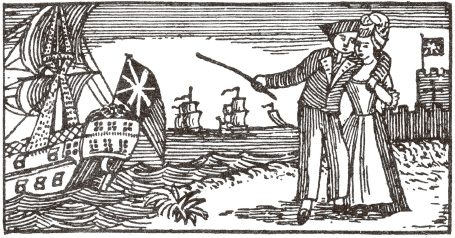
IV
Since Love Can Enter an Iron Door …
Lovers’ Tricks, Disguises and Obstacles Overcome
Since Love Can Enter an Iron Door …
Lovers’ Tricks, Disguises and Obstacles
When true love does not run smooth in folk song it is often because family members have placed obstacles in the way, and such opposition is invariably concerned with differences in social class and/or wealth, the song always being on the side of the lovers. It is not only parents who take against an unsuitable match – it can be uncles or guardians who interfere, and sometimes brothers (‘The Constant Farmer’s Son’, No. 115), and their action is often the most directly violent.
What happens next varies considerably from song to song. Sometimes there is simply a threat – ‘we will get him pressed to sea’, or ‘send her away’ – but where real action is taken it can be against the recalcitrant family member, or against the sweetheart.
The rule for lovers seems to be ‘get away quick’, because any dalliance simply gives the forces of opposition time to make their move. It is most often the male who is deemed unsuitable and in extreme cases he is quietly murdered, but in others he is framed for theft or, in the case of a failed elopement, for kidnap. Getting pressed to sea is perhaps the least of his worries. Where the unsuitable sweetheart is female (almost always a servant), she is simply dismissed, sent away, or taken abroad and left there, but she can also be framed for theft. In an obtuse sort of way, these songs do reflect something of the reality of life in eighteenth- and nineteenth-century rural England, where young working people were indeed at the mercy of their social superiors and employers.
But the action may be against the family member rather than the suitor, and the girl who falls for a lower-class boy is often shut away and, in extreme cases (‘The Daughter in the Dungeon’, No. 69), beaten and starved into submission, although in these cases she is nearly always rescued.
One of the most common themes of lovers’ tricks is the return of the man in disguise who tests the woman’s love in some way – usually by telling her that her sweetheart has died. Oddly enough, the girl on the receiving end of this treatment never gets indignant or gives him a clout round the ear, but always swoons into his arms. Another modern comment is, ‘How come she did not recognize him?’ But not only is the man often in disguise, it should also be pointed out that in the days before photographs ordinary people did not have any ‘likeness’ of their lover to pore over day by day. The ‘broken token’ theme, which occurs often in this context, is also a possible touch of reality, as people did (and still do) give each other such tokens on parting. It is not easy to break a gold ring in half, but it has been suggested that this refers to specially made lovers’ rings which were designed to separate into two.
But women can also play tricks. When they don male attire it is nearly always to follow their lover into the army or navy (see Part I on soldiers’ and sailors’ songs), and only rarely is it just for the fun of it as in ‘Polly Oliver’s Rambles’ (No. 72), or to test their lover’s resolve (see ‘The Female Highwayman’, Part IX, No. 134).
Another regular theme in song are the clever tricks played by girls on putative suitors, either to preserve their virtue, as in ‘Broomfield Hill’ (No. 63), ‘The Baffled Knight’ (No. 57) and ‘The Knight and the Shepherd’s Daughter’ (Part II, No. 31), or get their own back afterwards as in ‘Basket of Eggs’ (No. 59).
57
The Baffled Knight
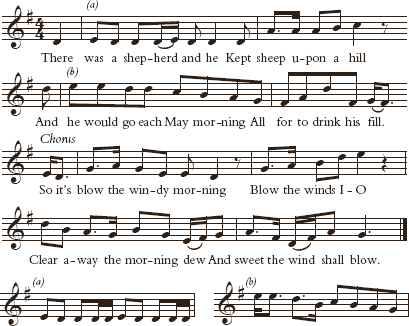
There was a shepherd and he
Kept sheep upon a hill
And he would go each May morning
All for to drink his fill.
Chorus
So it’s blow the windy morning
Blow the winds I-O
Clear away the morning dew
And sweet the wind shall blow.
He look-ed high and he look-ed low
And he gave a downward look
And there he spied a pretty maid
A-washing at the brook.
And then they rode along the road
Till they came unto the inn
And ready was the waiting maid
To let the lady in.
She jump-ed off her milk-white steed
And stepped within the inn
Crying, ‘You’re a beggar without
And I’m a maid within.’
‘You may pull off your shoes and hose
And let your feet go bare
And if you meet a pretty girl
You touch her if you dare.’
‘I won’t pull off my shoes or hose
Or let my feet go bare
But if I meet with thee again
Be hanged if I despair.’
58
The Banks of the Sweet Dundee
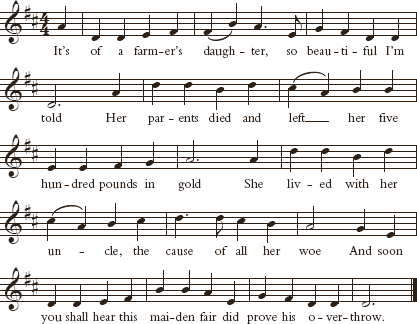
It’s of a farmer’s daughter, so beautiful I’m told
Her parents died and left her five hundred pounds in gold
She liv-ed with her uncle, the cause of all her woe
And soon you shall hear this maiden fair did prove his overthrow.
Her uncle kept a ploughboy young Mary loved so well
And in her uncle’s garden their tales of love did tell
There was a wealthy squire who oft her came to see
But still she loved her ploughboy on the banks of the sweet Dundee.
It was one summer’s morning her uncle went straightway
He knocked at her bedroom door and unto her did say
‘Come rise up, pretty maiden, a lady you may be
The squire is waiting for you on the banks of the sweet Dundee.’
‘A fig for all your squires, your lords and dukes likewise
My William’s hand appears to be worth diamonds in my eyes.’
‘Begone, you unruly female, ne’er happy you shall be
I mean to banish William from the banks of the sweet Dundee.’
The uncle and the squire rode out one summer’s morn
‘Young William is in favour,’ her uncle he did say
‘Indeed ’tis my intention to tie him to a tree
Or else to bribe the press gang on the banks of the sweet Dundee.’
The press gang came to William when he was all alone
He boldly fought for liberty but they were six to one
The blood did flow in torrents; ‘Pray kill me now,’ said he
‘For I’d rather die for Mary on the banks of the sweet Dundee.’
This maid one day was walking, lamenting for her love
She met the wealthy squire down in her uncle’s grove
He put his arms around her; ‘Stand off, base man,’ cried she
‘For you banished the only lad I love from the banks of the sweet Dundee.’
He clasped his arms around her and tried to throw her down
Two pistols and a sword she spied beneath his morning gown
Young Mary took the weapon, his sword he used so free
But she did fire and shot the squire on the banks of the sweet Dundee.
Her uncle overheard the noise and he hastened to the ground
Saying, ‘Since you have killed the squire, I’ll give you your death wound.’
‘Stand off,’ then cried young Mary, ‘undaunted I will be.’
So the trigger she drew and her uncle slew on the banks of the sweet Dundee.
The doctor soon was sent for, a man of noted skill
Likewise there came his lawyer for him to make his will
He willed his gold to Mary, who fought so manfully
And now she lives quite happy on the banks of the sweet Dundee.
59
Basket of Eggs
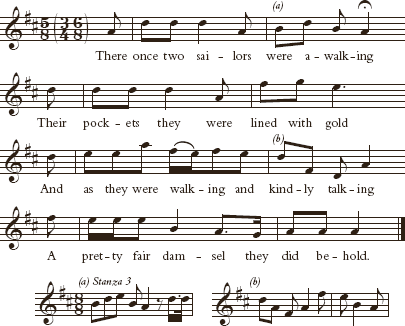
There once two sailors were a-walking
Their pockets they were lined with gold
And as they were walking and kindly talking
A pretty fair damsel they did behold.
Now this pretty damsel carried a basket
She set it down to get some ease
One of those sailors said, ‘May I take it?’
‘Oh yes kind sir, if you please.’
Now these two sailors walked on quite briskly
At the halfway house they pass-ed by
Pretty Nancy stepp-ed and so much lighter
And on them she kept her eye.
Now these two sailors called at an alehouse
They called for a pot of the very best
Saying, ‘Landlord, landlord, bring us some bacon
For in that basket there is some eggs.’
The landlord turned unto the basket
He turned away and with a smile
Said, ‘Sailor, sailor, you are mistaken
For instead of eggs there is a child.’
One of those sailors let out to swearing
The other he said, ‘It’s not worth the while
Here’s fifty guineas to any woman
Who’ll take and nurse this lovely child.’
Pretty Nancy standing at the window
She heard what those two sailors said
Crying, ‘Sir, I’ll take it and kindly use it
If you will see the money down paid.’
‘Are you that Nancy, that fairest Nancy
That I danced with last Easter day?’
‘Oh yes kind sir, and pleased your fancy
And now the fiddler you must pay.’
‘So let us go to yonder chapel
Where the knot it shall be tied
Where bells are ringing and sailors singing
And I’ll make you my lawful bride.’
60
The Blind Beggar’s Daughter of Bethnal Green
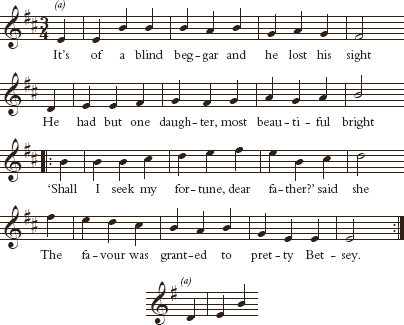
It’s of a blind beggar and he lost his sight
He had but one daughter, most beautiful bright
‘Shall I seek my fortune, dear father?’ said she
The favour was granted to pretty Betsey.
She set out for London, as I have heard say
And arrived in Bloomford that very same day
And when she came there unto my lord’s house
So handsomely admired was pretty Betsey.
She had not been there no length of time
Before a young lord a-courting her came
‘Your clothes shall be lined with jewels,’ said he
‘If you will but love me, my pretty Betsey.’
‘It’s all for to do it I am willing,’ said she
‘You must first ask the father of pretty Betsey.’
‘Then who is your father? Pray tell unto me
That I may go with you your father to see.’
‘My father is every day to be seen
He is called the Blind Beggar of Bethlem Green
He is called the Blind Beggar, God knows,’ says she
‘He has been a good father to his daughter Betsey.’
‘If you’re a blind beggar’s daughter you won’t do for me
A blind beggar’s daughter my lady shan’t be
A blind beggar’s daughter my lady shan’t be’
So scornfully turned from his pretty Betsey.
Then up spake a young squire, with riches enough
‘If she’s a blind beggar’s daughter she’s never the worse
Your clothes shall be lined with jewels,’ said he
‘If you will but love me, my pretty Betsey.’
‘Your daughter’s not clothed so fine as she shall be
For it’s I will drop guineas for you, my girl.’
He dropp-ed these guineas till they dropp’d on the ground
He dropp-ed till he dropp-ed ten thousand pound.
‘Dear honoured father, I’ve dropped all my store
I’ve dropped all my riches and I can’t drop no more
But grant me your daughter, and that’s all I crave
That I might be married to pretty Betsey.’
‘Oh take her and make her your lady so bright
There’s many a rich lord will owe you great spite
And when you are married, I will lay her down
Ten thousand bright guineas to buy her a gown.’
It’s Billy and Betsey to church they did go
It’s Billy and Betsey they cut a fine show
The most beautiful creature that ever was seen
Was the Blind Beggar’s daughter of Bethlem Green.
61
The Bonny Blue Handkerchief
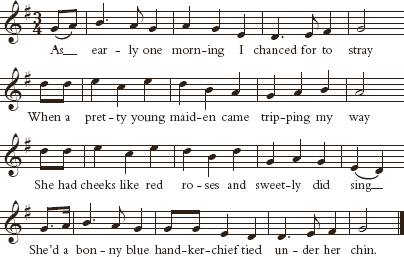
As early one morning I chanced for to stray
When a pretty young maiden came tripping my way
She had cheeks like red roses and sweetly did sing
She’d a bonny blue handkerchief tied under her chin.
‘Where art thou going, pretty maid?’ as I caught round her waist
‘Oh sir, do not stop me for I am in great haste
I am going to yond’ factory, there cotton to spin
With this bonny blue handkerchief tied under my chin.’
‘Then why wear that handkerchief tied round thy head?’
‘Because it’s the fashion to, kind sir,’ she said
‘And the fashion you know, sir, we like to be in
With this bonny blue handkerchief tied under my chin.’
Then to kiss those fond lips he going to begin
‘Oh stay, sir, oh stay, sir, whilst I tell you one thing
Who kiss these fond lips must show the gold ring
To the bonny blue handkerchief tied under my chin.’
‘This bonny blue handkerchief my love gave to me
And told me to wear it whilst he was at sea
Unto him I’ve proved true as the colour therein
With this bonny blue handkerchief tied under my chin.’
When he heard her so [loyal], he could not forbear
But threw his arms around her and called her his dear
Saying, ‘My dearest jewel, here is the gold ring
To the bonny blue handkerchief tied under your chin.’
When she heard him she knew him and went to his arms
And told of her love as he gazed on her charms
Forth to the church then they went and were married in speed
And this loving couple are happy indeed
When days are called over they sweetly do sing
Taken off the blue handkerchief tied under her chin.
62
Bonny Labouring Boy
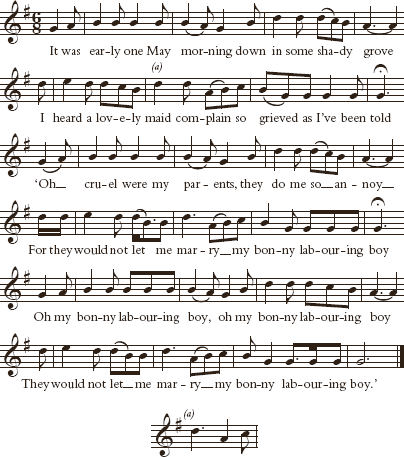
It was early one May morning down in some shady grove
I heard a lovely maid complain so grieved as I’ve been told
‘Oh cruel were my parents, they do me so annoy
For they would not let me marry my bonny labouring boy
Oh my bonny labouring boy, oh my bonny labouring boy
They would not let me marry my bonny labouring boy.’
It was early one May morning down in the shady grove
Pondering their hearts together some lovely band of love
Her father he came up to her, he took her by the hand
He swore he’d send young Johnny into some foreign lands
‘He locked me in my bedroom my troubles to annoy
But he would not let me marry my bonny labouring boy
Oh my bonny labouring boy’, etc.
‘My mother came next morning and unto me did say
“Your father has appointed and fixed your wedding day.”
But boldly I made answer and unto her did say
“Now single will I still remain for my bonny labouring boy
Oh my bonny labouring boy”’, etc.
‘So fill your glasses to the brim and drink so merrily round
Here’s a health to every labouring boy that ploughs and sows the ground
And when his day’s work’s over it’s oh my riddle and joy
So happy is the girl that weds my bonny labouring boy
Oh my bonny labouring boy’, etc.
63
Broomfield Hill
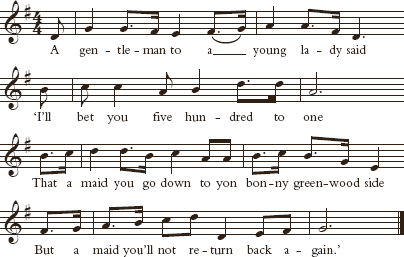
A gentleman to a young lady said
‘I’ll bet you five hundred to one
That a maid you go down to yon bonny greenwood side
But a maid you’ll not return back again.’
‘I’ll bet you the same,’ the young lady said
‘And the money I’ll freely lay down
That a maid I’ll go down to yon bonny green woods
And a maid I’ll return back again.’
Then she mixed him a glass of something so strong
He thought it had been some wine
And when he got down to yon bonny green woods
The sleep it came into his mind.
And when he got down to yon bonny green wood-side
Her lover he lie fast asleep
With his hare and his hounds in silk and satin gowns
And his ribbons hanging down to his feet.
Three times she walked round the crown of his head
And twice round the soles of his feet
And three times she kissed his cherry cherry cheeks
As he lied on the ground asleep.
She pulled off her finger her best diamond ring
And pressed it in her lover’s right hand
That was to let him know when he awakened out of sleep
That his lady had been, but was gone.
When he awakened out of his sleep
So well a-wakened was he
He turned his face towards yon bonny bonny broom
And wept most bitterly.
‘Oh where hast thou been to, my bonny greyhound?
And why did you stay so long?
And why did you not waken me out of sleep
Since the maiden has been but she’s gone?’
‘It’s three times I tapped at your silk and satin robe
And twice I groaned so loudly
But I could not awaken you out of sleep
Since the lady had been, but she’s gone.’
If I only had her fast in my arms
And I could but have my will
All the birds in the wood should drink of her blood
Until they had all had their fill.
64
Butter and Cheese and All
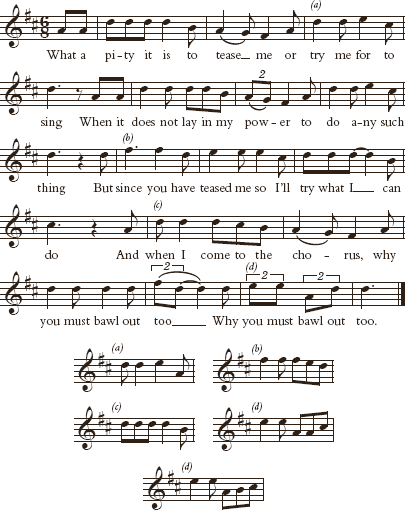
What a pity it is to tease me or try me for to sing
When it does not lay in my power to do any such thing
But since you have teased me so I’ll try what I can do
And when I come to the chorus, why you must bawl out too
Why you must bawl out too.
It’s with a cook I fell in love and the truth I don’t deny
For why a cook should have my choice I’ll tell you the reason why
Because she has plenty of mince pies, plum puddings and roast beef
And when my belly was empty she gave to me a relief
She gave to me a relief.
She sent me an invitation some supper for to take
I kindly did accept it all for my belly’s sake
And after supper was over of the cupboard I got the keys
One pocket I crammed with butter and the other I stuffed with cheese
The other I stuffed with cheese.
When supper being over about half an hour or more
When the master smelling of my cheese came tapping at the door
And I not knowing where to hide, up the chimney I did hide
And there I sat quite at my ease like a sweep exalted high
Like a sweep exalted high.
I hadn’t been long there sitting, a-sitting at my ease
When the fire began to melt my butter, likewise to toast my cheese
And every drop that fell in the fire, it caused the fire to flare
The old man looked up the chimney and swore that Satan was there
And he swore that Satan was there.
Then up to the chimney top he got and down some water poured
And I came tumbling after, my butter and cheese and all
But I’m safe down from the chimney now with a smut and a greasy face
And out in the street I nimbly ran and down the street I was chased
And down the street I was chased.
The dogs did bark, the children screamed, up flew the windows all
And every soul cried out ‘Well done’ as loud as they could bawl
So to make an end to my ditty, boys, I hope I ain’t kept you long
So we’ll wish success to the chorus and sing another good song
And sing another good song.
65
Caroline and Her Young Sailor Bold
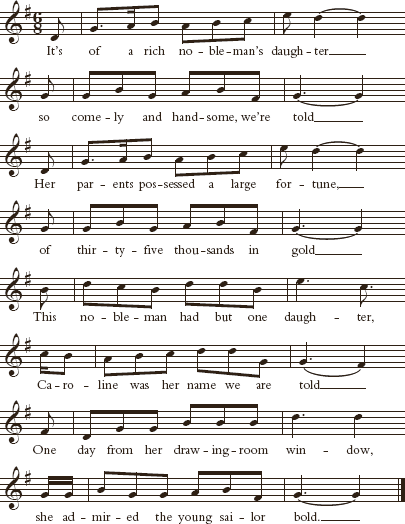
It’s of a rich nobleman’s daughter, so comely and handsome, we’re told
Her parents possessed a large fortune, of thirty-five thousands in gold
This nobleman had but one daughter, Caroline was her name we are told
One day from her drawing-room window, she admir-ed the young sailor bold.
His cheeks, they appeared like two roses, his hair was as black as the jet
Young Caroline watched his departure, when around with young William she met
She says, ‘I’m a rich nobleman’s daughter, possessed of ten thousand in gold
I’ll forsake both my father and mother, to wed with the young sailor bold.’
He said, ‘My dear young lady, remember, your parents you’re bound for to obey
And in sailors there is no depending, when their true loves are left far behind
I advise you to stay at home with your parents, and do by them as you are told
And never let anyone tempt you, to wed with the young sailor bold.’
She says, ‘I’ll be persuaded by no one one moment to alter my mind
I’ll ship and proceed with my true love, and he never shall leave me behind.’
So she dressed like a gallant young sailor, in her trousers and jacket we’re told
Four years and a half on the salt seas, she ploughed with her young sailor bold.
For three times with him she was shipwrecked, but she always proved like a man
And her duty she done like a sailor, when aloft in her jacket so blue
Her parents long wept and lamented, tears from their eyes in torrents did flow
Till at last they arrived in old England, Caroline and her young sailor bold.
Young Caroline went straight to her father, with her jacket and trousers so blue
Her father one moment lie fainting, when at first she appeared in his view
She said, ‘My dear father, forgive me, deprive me for ever of gold
Grant me your request, I’m contented, to wed with my young sailor bold.’
Her father admir-ed young William, and vowed that in sweet unity
That if life should be spared until morning, they bound together should be
They were married and Caroline’s portion was thirty-five thousands in gold
And now they live happy and cheerful, Caroline and her young sailor bold.
66
Claudy Banks
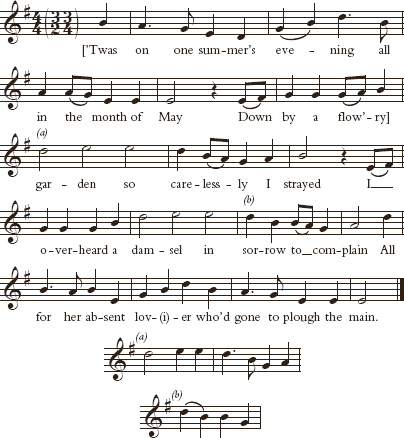
[’Twas on one summer’s evening all in the month of May
Down by a flowery] garden so carelessly I strayed
I overheard a damsel in sorrow to complain
All for her absent lov-i-er who’d gone to plough the main.
I boldly stepped up to her, which put she in surprise
She really did not know me, I being in disguise
[I said, ‘My charming creature,] my joy and heart’s delight
How far have you to wander this dark and dreary night?’
‘It’s all the way to Cloddy Banks, if you will please to show
Pity a maid distracted, not knowing where to go
I am in search of my true love and Johnny is his name
All on the Banks of Cloddy, I am told he do remain.’
‘Oh it’s six long weeks or better since your Johnny’s left this shore
He’s crossing the wide ocean where thundering billows roar
He’s crossing the wide ocean for honour [and for gain]
Till I were told the ship got wrecked all on the coast of Spain.’
Oh hearing of this dreadful news, it put she in despair
Wringing her hands and crying and tearing of her hair
‘Now Johnny’s gone and left me, no other will I take
Once more to woods and valleys, I’ll wander for his sake.’
Oh hearing of this pretty maid, he could no longer stand
For he fell into her arms, crying, ‘Betsy, I’m that man
I am your false young man, which you thought was slain
But since we met on Cloddy Banks, we’ll never part again’
Crying, ‘Betsy I’m your false young man, which you thought was slain
But since we’ve met on Cloddy Banks we’ll never part again.’
[spoken] Cloddy Banks.
67
Dabbling in the Dew
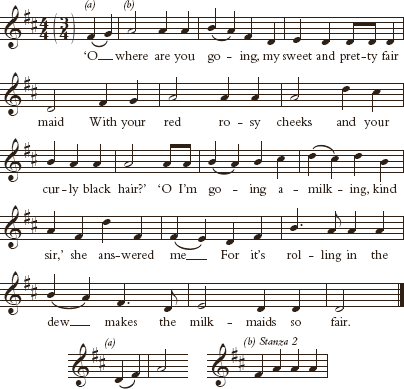
‘O where are you going, my sweet and pretty fair maid
With your red rosy cheeks and your curly black hair?’
‘Oh I’m going a-milking, kind sir,’ she answered me
For it’s rolling in the dew makes the milkmaids so fair.
‘Shall I go along with you, my sweet and pretty fair maid
With your red rosy cheeks and your curly black hair?’
‘Just as you please, kind sir,’ she answered me
For it’s rolling in the dew makes the milkmaids so fair.
‘Supposing I should lay you down, my sweet and pretty fair maid
With your red rosy cheeks and your curly black hair?’
‘Then you would have to pick me up again, kind sir,’ she answered me
For it’s rolling in the dew makes the milkmaids so fair.
‘Supposing you should be with child, my sweet and pretty fair maid
With your red rosy cheeks and your curly black hair?’
‘Then you would be the father of it, kind sir,’ she answered me
For it’s rolling in the dew makes the milkmaids so fair.
‘What would you do for linen, my sweet and pretty fair maid
With your red rosy cheeks and your curly black hair?’
‘My father he’s a linen-draper, kind sir,’ she answered me
For it’s rolling in the dew makes the milkmaids so fair.
‘What would you do for a cradle, my sweet and pretty fair maid
With your red rosy cheeks and your curly black hair?’
‘My brother he’s a basket-maker, kind sir,’ she answered me
For it’s rolling in the dew makes the milkmaids so fair.
‘Supposing I should go to sea, my sweet and pretty fair maid
With your red rosy cheeks and your curly black hair?’
‘Then I might follow after you, kind sir,’ she answered me
For it’s rolling in the dew makes the milkmaids so fair.
‘Supposing I should jump overboard, my sweet and pretty fair maid
With your red rosy cheeks and your curly black hair?’
‘Then the Devil would jump after you, kind sir,’ she answered me
For it’s rolling in the dew makes the milkmaids so fair.
68
Dark-Eyed Sailor
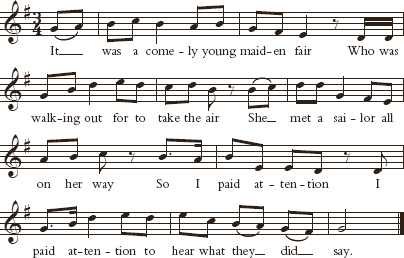
It was a comely young maiden fair
Who was walking out for to take the air
She met a sailor all on her way
So I paid attention
I paid attention to hear what they did say.
Said William, ‘Lady, why do you roam?
The night is coming and the day’s near gone.’
She said, while tears from her eyes did fall
‘It’s my dark-eyed sailor
It’s my dark-eyed sailor that’s proved my downfall.’
‘It’s two long years since he left this land
He took a gold ring from off my hand
He broke it in two, one part’s with me
And the other rolling
And the other rolling in the bottom of the sea.’
Said William, ‘Drive him from your mind
Some other sailor as good you’ll find
Love turns aside and soon doth grow
Like a winter’s morning
Like a winter’s morning when the land is covered with snow.’
Says Ada dear, ‘I’ll ne’er disdain
A tarr-ed sailor I’ll treat the same
So drink his health, here’s a piece of coin
But it’s a dark-eyed sailor
It’s a dark-eyed sailor still claims this heart of mine’
‘For his coal-black eyes and his curly hair
His pleasing tongue doth my heart ensnare
Genteel he was, not a rake like you
To advise a maiden
To advise a maiden to slight the jacket blue.’
Said, ‘Ada dear, this fond heart’s in flame.’
She said, ‘On me you shall play no game.’
She drew a dagger and then did cry
‘For my dark-eyed sailor
For my dark-eyed sailor a maid I’ll live and die.’
Then half the ring did young William show
She was distracted, mixt joy and woe
‘O welcome William, I’ve land and gold
For my dark-eyed sailor
For my dark-eyed sailor so manly and bold.’
Then in a village down by the sea
They joined in wedlock and well do agree
So all maids be true when your love’s away
For a cloudy morning
For a cloudy morning brings forth a pleasant day.
69
The Daughter in the Dungeon
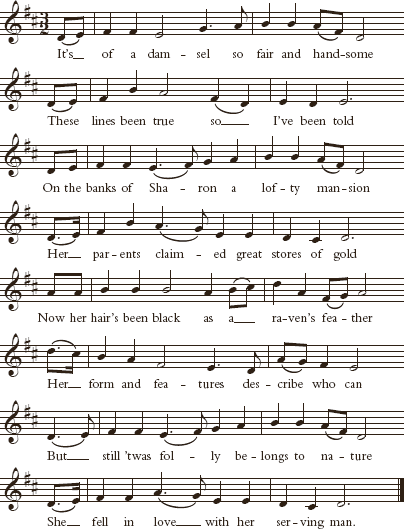
It’s of a damsel so fair and handsome
These lines been true so I’ve been told
On the banks of Sharon a lofty mansion
Her parents claimed great store of gold
Now her hair’s been black as a raven’s feather
Her form and features describe who can
But still ’twas folly belongs to nature
She fell in love with her serving man.
When these two true lovers was fondly talking
O the wicked father in anger flies
He swore two lovers he would have them parted
Her wicked father as he drew nigh
To build a dungeon was his intention
To part true lovers he continued a plan
He swore an oath, it was too vile to mention
He would part the fair one from her serving man.
To build a dungeon of bricks and mortar
A flight of steps it was underground
The food he gave her was bread and water
That was the only cheer for her was found
Young Edwin found out her habitation
’Twas well secured by an iron door
He swore in spite of all the nation
He would give her freedom and rest no more.
Then at his leisure he talked with pleasure
To gain releasement for Mary Anne
He found his object and winned his pleasure
She cried, ‘My faithful young serving man.’
Now a suit of clothes he brought his Polly
’Twas a man’s apparel for to disguise
‘For your sweet sake I’ll face your father
To see you here will him surprise.’
When the cruel father brought bread and water
Thus to her father she then began
‘If I’ve disgraced my own dear father
I’ll lay and die for my serving man.’
Three times a day he’d cruelly beat her
And thus to her father she then began
Young William entered, ‘I’ve found your daughter
For the willing fault is your serving man.’
Soon he found his daughter vanished
Like a lion he did roar
He swored from Ireland he should be banished
‘With my broadsword I’ll spill your gore.’
‘Agreed,’ said Edwin, ‘then at your leisure
Since I have freed her do all you can
Forgive your daughter, I’ll die with pleasure
For the willing fault is your serving man.’
[When her father found him so tender-hearted
Then down he fell on the dungeon door
Saying that love should never be parted
Since love can enter an iron door]
Now they’re joined and part no more
To roll in riches this couple can
Young Edwin and Mary they lives together
She’ll have ever blessed her serving man.
70
Erin’s Lovely Home
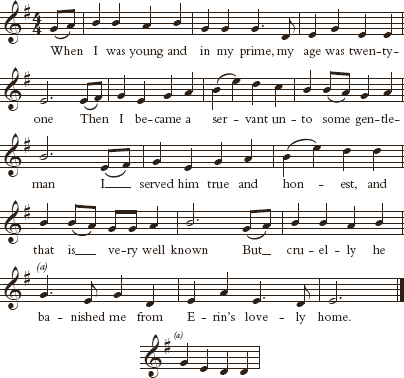
When I was young and in my prime, my age was twenty-one
Then I became a servant unto some gentleman
I served him true and honest, and that is very well known
But cruelly he banished me from Erin’s lovely home.
’Twas down in her uncle’s garden all in the month of June
A-viewing of those pretty flowers all in their youthful bloom
She said, ‘My dearest Johnny, if with me you will roam
We’ll bid adieu to all our friends in Erin’s lovely home.’
Now the very night I gived consent, along with her to go
From her father’s dwelling place, which proved my overthrow
The night being bright by the moonlight, we both set off to roam
Thinking we had got safe away from Erin’s lovely home.
But when we got to Belfast, ’twas by the break of day
My true love she got ready a passage for to pay
Five hundred pounds she did pay down, saying, ‘That shall be your own
And never mourn the friends we’ve left in Erin’s lovely home.’
But of our great misfortune I mean to let you hear
’Twas in a few hours or afterwards her father did appear
He marched me back to Omagh jail in the county of Tyrone
And then I was transported from Erin’s lovely home.
But when I heard my sentence, it grieved my heart full sore
And parting from my sweetheart, it grieved me ten times more
I had seven lengths all on my chain and every link a year
Before I was returned again to the girl I loved so dear.
But when the rout came to the jail to take us all away
My true love she came on to me and thus to me did say
‘Bear up your heart, don’t be dismayed, for it’s you I’ll never disown
Until you do return again to Erin’s lovely home.’
71
Fair Maid Walking in Her Garden
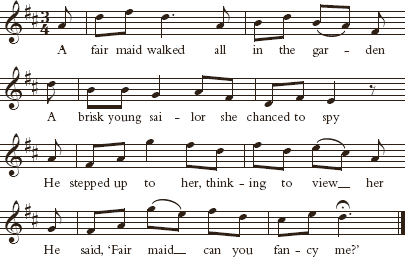
A fair maid walked all in the garden
A brisk young sailor she chanced to spy
He stepped up to her, thinking to view her
He said, ‘Fair maid can you fancy me?’
‘You seem to appear like some man of honour
A man of honour you seem to be
How can you impose on a poor young woman
Who is not fitted your servant to be?’
‘I don’t impose on a poor young woman
A great regard, love, I have for you
I mean to marry you, make you my lady
Servants I have to wait on you.’
‘I have a sweetheart all of my own, sir
And seven long years he has been gone from me
And seven more I will wait for him
If he is alive he’ll return to me.’
‘If it’s seven years since he has left you
Perhaps he is now dead or drowned?’
‘And seven more I will wait for him
But if he is dead he is in glory crowned.’
He took his hands out of his bosom
His fingers being both long and small
Saying, ‘I am your young, poor and single sailor
I am returned to marry you.’
‘If you are my young, poor and single sailor
Show me the token of what you gave
Saying, “Here’s the ring that was broke between us.”’
Soon as she saw it then down she fell.
He took her up into his arms, love
He gave her kisses by one, two and three
Saying, ‘I am your young, poor and single sailor
I am returned for to marry thee.’
So now this couple they are got married
In wedlock’s bands they now both are joined
I hope they’ll live and enjoy each other
And that’s the end of my sailor song.
72
Polly Oliver’s Rambles
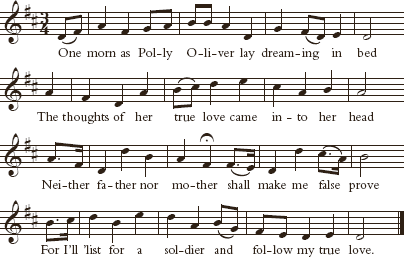
One morn as Polly Oliver lay dreaming in bed
The thoughts of her true love came into her head
Neither father nor mother shall make me false prove
For I’ll ’list for a soldier and follow my true love.
Next morning Polly Oliver very early arose
And dressed herself up in a man’s suit of clothes
With a waistcoat and jacket and a sword by her side
On her father’s green dragon away she did ride.
On she rode till she came to the sign of the Crown
And called for a pint of strong ale that was brown
And the first that came in was a man from abroad
And the next that came in was Polly Oliver’s true love.
‘Oh good morning, kind captain, good morning,’ said she
[‘Here’s a letter from your true love Polly Oliver,’ said she
He opened the letter and a guinea was found
‘For you and your companion to drink your health all round.’]
When supper was over she hung down her head
And called for a candle to light her to bed
The captain made this reply, ‘There’s a bed at my feet
And you may lie in it, countryman, if you please.’
[‘To lie with a captain is a dangerous thing]
I’m a new ’listed soldier to fight for my Queen
To fight for my Queen, my boys, on land or by sea
[Since you are my captain I’ll be at your command.’]
Next morning very early Polly Oliver arose
And dressed herself up in her own suit of clothes
[And downstairs she came from her chamber above
Saying, ‘Here is Polly Oliver, your own true love.’
He at first was surprised, then laugh’d at the fun
And then they were married and all things were done]
If I lay with you the first time the fault was not mine
And I hope to use you better the very next time.
73
The Pretty Ploughboy
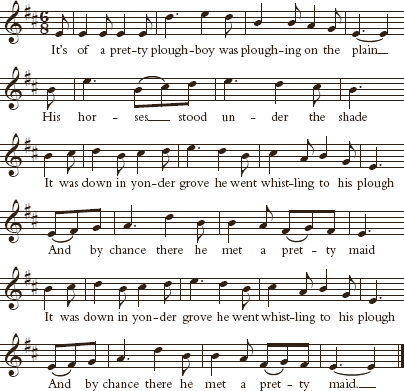
It’s of a pretty ploughboy was ploughing on the plain
His horses stood under the shade
It was down in yonder grove he went whistling to his plough
And by chance there he met a pretty maid
It was down in yonder grove he went whistling to his plough
And by chance there he met a pretty maid.
And this was his song as he walk-ed along
‘I’m afraid, young maid, you’re of some high degree
If I should fall in love and your parents they should know
The next thing they would send me off to sea
If I should fall in love and your parents they should know
The next thing they would send me off to sea.’
When her aged parents they came all for to know
This ploughboy was ploughing on the plain
The press gang they sent and they pressed her love away
And they sent him in the wars to be slain
The press gang they sent and they pressed her love away
And they sent him in the wars to be slain.
Then she dressed herself all in her best
And her pockets were lined with gold
To see her trudge the streets with the tears all in her eyes
She was seeking for her pretty ploughing boy
To see her trudge the streets with the tears all in her eyes
She was seeking for her pretty ploughing boy.
The first that she met was a jolly sailor bold
‘Have you seen my pretty ploughboy?’ she cried
‘Yes, he’s just across the deep and he’s sailing for his fleet’
Then he said, ‘My pretty lady, will you ride?
Yes, he’s just across the deep and he’s sailing for his fleet’
Then he said, ‘My pretty lady, will you ride?’
She rode till she came to the ship her love was in
And unto the captain she complained
She said, ‘I’m come to seek for my pretty ploughing boy
That was sent all in the wars to be slain’
She said, ‘I’m come to seek for my pretty ploughing boy
That was sent all in the wars to be slain.’
Then five hundred bright guineas she fairly did pull out
And so gently she told them all over
And when she got her ploughboy all in her arms
She hugged him till she got him safe on shore
And when she got her ploughboy all in her arms
She hugged him till she got him safe on shore.
And when she got her ploughboy all in her arms
Where many a time he had been before
She set the bells to ring and so merrily she did sing
For she’d met with the lad whom she adored
She set the bells to ring and so merrily she did sing
For she’d met with the lad whom she adored.
Now it’s God bless the day when these true lovers met
And their sorrows shall never be no more
For the last cruel war called so many lads away
And their true lovers they never saw them more
For the last cruel war called so many lads away
And their true lovers they never saw them more.
74
William and Mary
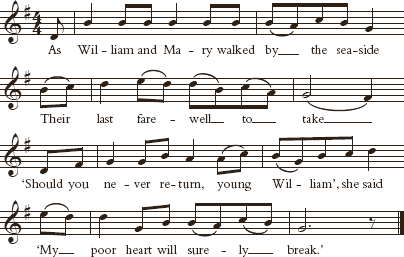
As William and Mary walked by the seaside
Their last farewell to take
‘Should you never return, young William,’ she said
‘My poor heart will surely break.’
‘Be not thus dismay’d,’ young William he said
As he pressed the dear maid to his side
‘Nor my absence don’t mourn, for when I return
I will make little Mary my bride.’
Three years passed by without any news
When at last as she sat at her door
An old beggar came by, with a patch on his eye
Quite lame, and did pity implore.
Mary started and trembled; ‘Oh tell me,’ she cried
‘All the money I’ve got I will give
Oh this I do ask you, if you will tell me true
Only say, does my dear William live?’
‘Oh I love him so dear, so true and sincere
That no other I swear beside
If in riches he rolled and was clothed in gold
Should make little Mary his bride.’
‘Forgive me, dear maid,’ then William he said
‘Your love it was only I tried
To church let’s away, for ere the sun sets
I’ll make little Mary my bride.’
75
William Taylor
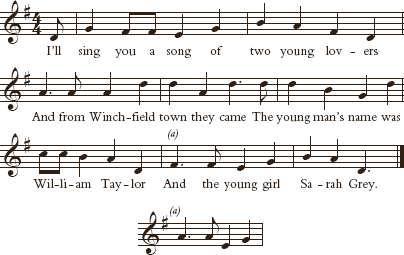
I’ll sing you a song of two young lovers
And from Winchfield town they came
The young man’s name was William Taylor
And the young girl Sarah Grey.
William ’listed for a soldier
To the army he did go
William ’listed for a soldier
Much to Sally’s grief and woe.
Sally dressed in man’s apparel
To the army she did go
Sally dressed in man’s apparel
For to be with her Willie dear.
One day as they were exercising
She appeared among the rest
A silver locket flowed from her jacket
And it showed her milk-white breast.
The Captain he stepped up towards her
Asking her what brought her here
‘Sir, I’m come for my own true lover
Who is fighting in this war.’
‘If you want your own true lover
I pray to me then tell his name.’
‘Sir, his name is William Taylor
And from Winchfield Town he came.’
‘If you rise early tomorrow morning
Early at the break of day
There you’ll see poor William Taylor
Walking out his lady gay.’
Sally rose early in the morning
Early at the break of day
There she saw her own true lover
Walking out his lady gay.
Sally called for a brace of pistols
Which was given at her command
There she shot poor William Taylor
With his bride at his right hand.
A few years after Sally got married
She became the Captain’s wife
A few years after Sally got married
Now she lives a happy life.